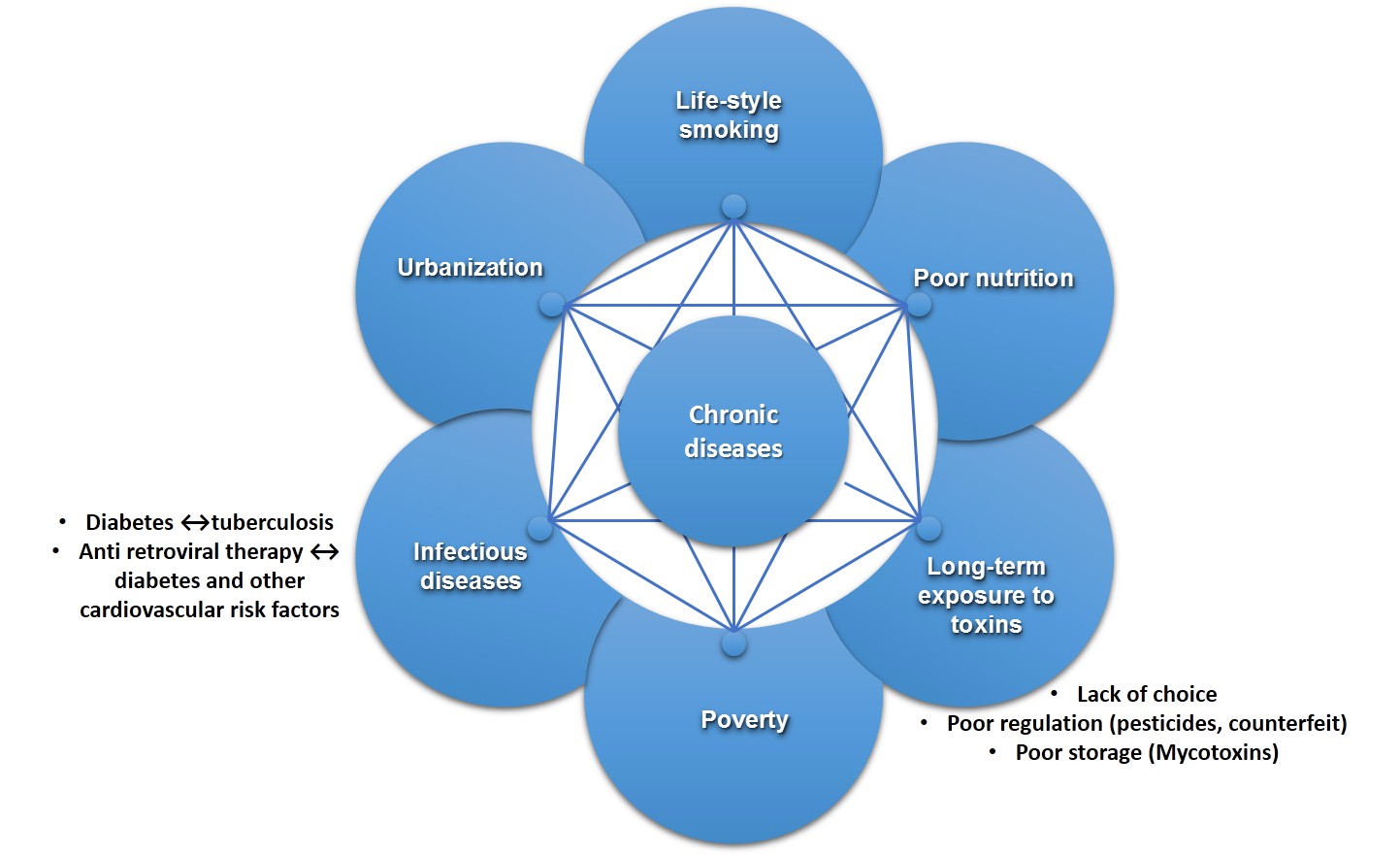THE NEED TO PROMOTE FIBRE CONSUMPTION
The epidemic of chronic diseases is global, affecting both Africa and Europe, and is associated with poor nutrition, sedentary lifestyles, increased alcohol consumption and cigarette smoking. The chronic diseases include cardiovascular disease, cancer, chronic respiratory disease, and type 2 diabetes. The occurrence of these diseases in developing
countries is accelerating at a faster rate than it did in industrialized countries.
 Figure 1. Schematic figure showing the cause of chronic diseases.
Figure 1. Schematic figure showing the cause of chronic diseases.
Reducing the prevalence of chronic diseases in the world entails strategic planning that involves not only investment in medical diagnostic facilities to detect the early symptoms of this diseases but also considerations of preventive measures. One key consideration is to promote the consumption of healthy diets especailly the utilization of whole grain or cereal fibre rich products rather than products made from refined grains. The
Studies consistently show that whole grain and cereal fibre protect against chronic diseases such as diabetes, cardiovascular diseases and cancer. A hindrance to consumption of whole grain and cereal fibre-rich products is there poor sensory properties e.g. texture compared to products made from refined flour. Therefore research on technologies to deliver acceptable high fibre whole grain products is highly essential. Much can be learnt from exchanging the traditions of whole grain processing and consumption in Africa and Europe that are largely based on fermentation. In Europe for example, rye sourdough breads are an important source of dietary fibre and the corresponding bioactive components. Similarly, fermented semi-solid cooked dough’s, porridges and liquid beverages made from indigenous whole grains such as sorghum and millet have a long tradition in Africa. The sorghum and millet-based products are of current interest for production of novel gluten-free products
THE FIBREPRO PROJECT
This project, aims to explore the advantages of traditional fermentations methods of whole grain consumption and current knowledge of cereal bioprocessing in order to develop affordable and acceptable cereal fibre-rich products for both Africa and Europe. The project takes a multidisciplinary approach, bringing together experts on food technology, food chemistry, microbiology and nutrition in Africa (Kenya and Burkina Faso) and Europe (Finland and Portugal). The current project focuses on studying tailored fermentation processes with carefully selected lactic acid bacteria, for whole grain wheat bread in Africa and whole grain gluten-free products made from sorghum and millet for Europe. The project begins with assessment of dietary fibre consumption and the role of whole grains or cereal dietary fibre in Kenya and Burkina Faso. To develop high quality whole grain products, starter cultures that efficiently deliver functional metabolites (exopolysaccharide, antimicrobial compounds) will be isolated, and characterised from traditional fermented products in Africa. Factors that will ensure enhanced production of the functional metabolites in model fermented whole grain matrices will be optimised. Consequently the potential starter cultures will be utilised to tailor fermented whole grain products. Emphasis in design will be natural, additive-free products with at least 6 % dietary fibre content.
The results obtained from this project will enhance knowledge on dietary fibre intake in the African partner countries, the properties of functional metabolites from the selected isolated starter cultures and their optimisation for whole grain and cereal fibre-rich products. The results obtained will be disseminated to the public, scientific and industrial community. Partnership with local authorities will be encouraged throughout the project.